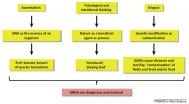DNA study could shed light on how genetic faults trigger disease
2015-04-24
(Press-News.org) A new technique that identifies how genes are controlled could help scientists spot errors in the genetic code which trigger disease, a study suggests.
The method focusses on those parts of DNA - known as enhancer regions - which regulate the activity of genes and direct the production of proteins that have key functions within the body.
Errors in protein production can result in a wide range of diseases in people, researchers say.
The new method could help researchers pinpoint the source of disease-causing mutations in enhancers. Until now, these genetic errors have been difficult to interpret as the link between enhancers and the genes they control was not clear.
Researchers at the University of Edinburgh were part of an international collaboration that identified all the enhancers - and the genes they activate - on a single human chromosome.
The team then tested the technique in zebrafish and found that genes are controlled by enhancers in a similar way, suggesting that this type of regulation takes place in all animals.
Individual genes may be under the control of many enhancers, which allow gene activation to be carefully regulated, the team says. This allows precise control of gene activity, which is important during development and in maintaining normal brain function.
The study, published in the journal Nature Communications, was funded by the Seventh Framework Programme of the European Union. The study was carried in close collaboration with researchers based in other parts of the UK, France, Germany, Australia, and Norway.
Professor David FitzPatrick, of the University of Edinburgh's MRC Human Genetics Unit, who took part in the study, said: "This work is an important step in identifying which enhancers control which genes, and this will help us in interpreting the genetic changes we see in the part of the genome that does not code for protein."
INFORMATION:
ELSE PRESS RELEASES FROM THIS DATE:
2015-04-24
ANN ARBOR, Mich. -- Nearly half of American hospitals aren't taking key steps to prevent a kind of gut infection that kills nearly 30,000 people annually and sickens hundreds of thousands more - despite strong evidence that such steps work, according to a new study.
While nearly all of the 398 hospitals in the study use a variety of measures to protect their patients from Clostridium difficile infections, 48 percent haven't adopted strict limits on the use of antibiotics and other drugs that can allow the dangerous bug to flourish, the researchers report.
Hospital ...
2015-04-24
This news release is available in German. The world is a risky place. But our subjective fears and anxieties are often at odds with the evidence. New findings by scientists at the Max Planck Institute for Human Development and the University of Konstanz show that subjective fears about potential risks may be amplified in social exchange. Their findings have now been published in the journal Proceedings of the National Academy of Sciences (PNAS).
In our information society, information about risks such as Ebola and measles can spread like wildfire - be it through ...
2015-04-24
A team of Belgian philosophers and plant biotechnologists have turned to cognitive science to explain why opposition to genetically modified organisms (GMOs) has become so widespread, despite positive contributions GM crops have made to sustainable agriculture. In a paper published April 10 in Trends in Plant Science, they argue that the human mind is highly susceptible to the negative and often emotional representations put out by certain environmental groups and other opponents of GMOs. The researchers urge the general public to form opinions on GMOs on a case-by-case ...
2015-04-24
DURHAM, N.C. -- Orphaned children in low- and middle-income countries face a high risk of trauma, with physical and sexual abuse being by far the most prevalent traumatic events.
New research shows that orphaned boys in these settings are just as likely to experience abuse as girls. As a result, the study authors suggest targeting more support services and prevention programs toward protecting vulnerable boys.
Researchers from Duke University and the University of North Carolina at Chapel Hill found that physical and sexual abuse affects 12 percent of girls and 14 ...
2015-04-24
Thinking "time is money" can be a barrier for people to act in environmentally friendly ways, even for tasks like recycling that take mere seconds, according to UBC research.
As Earth Day approaches on April 22, this dynamic has led to an unsettling outcome.
"Putting a price tag on time leaves individuals to focus on their own needs and goals, as opposed to the needs and goals of others, including the environment," says Ashley Whillans, PhD student in UBC's Department of Psychology and lead author of a paper on the subject.
In one of the paper's studies, a group of ...
2015-04-24
The gold standard for analyzing the behavior of fusion plasmas may have just gotten better. Mario Podestà, a staff physicist at the U.S. Department of Energy's Princeton Plasma Physics Laboratory (PPPL), has updated the worldwide computer program known as TRANSP to better simulate the interaction between energetic particles and instabilities - disturbances in plasma that can halt fusion reactions. The program's updates, reported this week in the journal Nuclear Fusion, could lead to improved capability for predicting the effects of some types of instabilities in future ...
2015-04-24
Negative feedback can sting, but thinking about the big picture may help transform criticism into positive change, according to new research published by the Society for Personality and Social Psychology.
"People are defensive when they are told about something they did wrong," said lead researcher Jennifer Belding, Ph.D., from Ohio State University. "Listening to negative feedback requires self-control because you have to get past the fact that hearing it hurts and instead use the information to improve over time."
In three experiments, researchers found that ...
2015-04-24
24.4.2015: Gigantic volumes of hot material rising from the deep earth's mantle to the base of the lithosphere have shaped the face of our planet. Provided they have a sufficient volume, they can lead to break-up of continents or cause mass extinction events in certain periods of the Earth's history. So far it was assumed that because of their high temperatures those bodies - called mantle plumes - ascend directly from the bottom of the earth's mantle to the lithosphere. In the most recent volume of Nature Communications, a team of researchers from the Geodynamic Modeling ...
2015-04-24
A new study of the complex interplay between organisms and their environment shows that biodiversity--the variety of organisms living on Earth--is even more important to the healthy functioning of ecosystems than previously thought.
The findings bolster the view that conservation of biodiversity benefits the plants and animals directly involved, and by extension the human populations that rely on these organisms and ecosystems for food, water, and other basic services.
Lead author on the study, to be published in the online journal Nature Communications on April 24, ...
2015-04-24
Philadelphia, April 24, 2015 -- Once-daily oral grazoprevir/elbasvir combination therapy, taken without interferon or ribavirin for 12 weeks, demonstrated high sustained virologic response rates for treatment-naïve patients with cirrhotic or non-cirrhotic chronic hepatitis C virus (HCV) genotype 1, 4, or 6. These findings suggest that once-daily oral grazoprevir/elbasvir represents a new therapeutic option for chronic HCV infection.
Data from the Phase 3 C-EDGE Treatment-Naïve Trial are being presented for the first time at the 50th annual congress of the European ...
LAST 30 PRESS RELEASES:
[Press-News.org] DNA study could shed light on how genetic faults trigger disease


